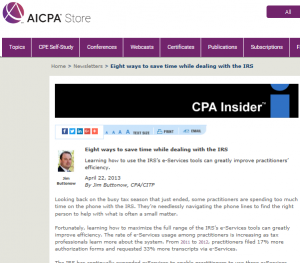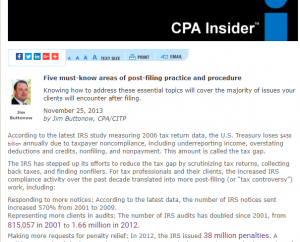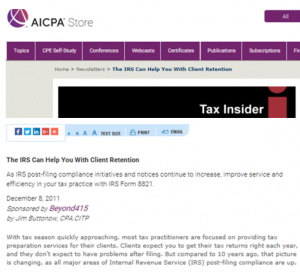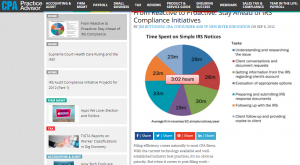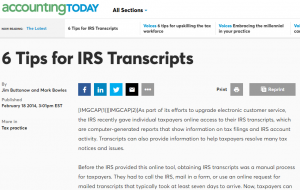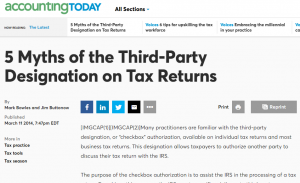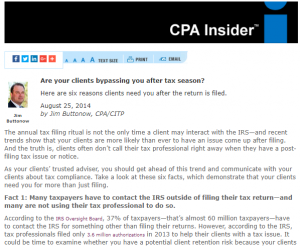Tax pros can use IRS e-services to get information and help their clients, especially with a tax problem. Here are my eight suggestions for the IRS to improve e-services. This article was highlighted by the Taxpayer Advocate in her annual report to Congress and many suggestions were also included in the 2014-2016 IRS Electronic Tax Administration Advisory Committee recommendations that I chaired for the 2015 and 2016 report years.
The five must-know areas of post-filing practice and procedure
If you responsible for helping people with tax problem solving, here are the 5 must-know areas based on the number of people who have tax problems. Master these 5 essentials and you are a tax problem solver. My AICPA CPA Insider article educates tax pros on the 5 areas they need to know and why.
The IRS Can Help you with Client Retention
My AICPA CPA Insider article to help tax pros and their firms serve their clients better after they file their tax return. Tax firms can use Form 8821 to proactively get information on a clients IRS account, including notices, and be able to respond timely.
The Notice Boom: New IRS compliance practices mean big changes for tax practitioners
The IRS new compliance strategy: coverage by notice. My Accounting Today article outlines the reasons why we are seeing a 570% increase in the number of IRS notices since 2001 – and what you can do about it.
From Reactive to Proactive: Stay Ahead of IRS Compliance Initiatives
My CPA Practice Advisor article to help tax pros identify their clients’ tax issues at the same time as their client by getting copied on their tax notices. I have helped hundreds of firms set up this proactive strategy that greatly improves their client relationships and puts them in the “know.”
This Valentine’s Day, Should You Check With The IRS Before You Say “I do”?
Here is my Valentine’s Day article to help evaluate whether your spouse has an outstanding tax issues. If they do, you may be helping them with tax problems for years to come.
Be prepared to answer six client questions about IRS transcripts
My Accounting Today article about explaining how to use and read IRS transcripts. The types of transcripts, how to obtain them, when they are available and for what years, and how to use them are explained in this article.
5 Myths of the Third-Party Designation on Tax Returns
The third-party designation on a tax return allows the third-party (usually the tax preparer) only allows the person or firm to help the IRS with the processing of the tax return. Maybe Form 2848, Power of Attorney, or Form 8821, Tax Information Authorization, is more appropriate to allow a third party to get information from the IRS and deal with any issues. Find out more in my Accounting Today article.
Are they still your clients? The IRS may think so.
My Accounting Today article that many CPA associations have republished regarding Forms 2848- Power of Attorney. Many tax pros and taxpayers do not withdraw or revoke the Power of Attorney authorization that they provide to their tax professional after the tax pro helps them with a tax problem. When you file a POA form with the IRS, the IRS treats the tax pro as if they are the taxpayer. All taxpayers and tax pros should consider withdrawing or revoking the authorization after the tax problem is solved. If not, the tax pro will still be the “taxpayer” in the eyes of the IRS.
Are your clients bypassing you after tax season?
A part of being a year-round trusted tax advisor is helping your clients if they have a tax problem. In this AICPA CPA Insider article, I outline how many taxpayers have a tax problem and what assistance they need from their tax pro.
